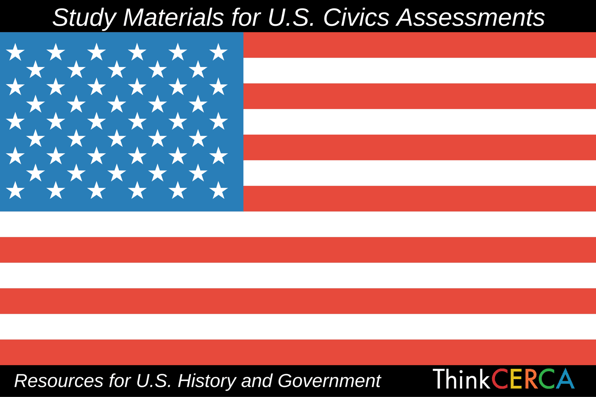
Study Materials for U.S. History and Civics Exams
Leveled lessons to prep your students for any civics assessment
With discipline-specific assessments like the NAEP’s Civics Assessment, the GED Social Studies Test, and the New York Regents U.S. History and Government Exam, teachers need resources to engage students in memorable learning experiences to ensure information is retained well beyond test day.
If your students are preparing for any U.S. civics assessment, look no further. Enlist ThinkCERCA’s help to get the resources you need with study materials for U.S. government and U.S. history exams.
Our social studies informational texts provide the necessary background information critical for success, whether you’re preparing students for new state assessments or AP government exams. ThinkCERCA’s historical nonfiction lessons support student learning while also covering important events and influential Americans. Students will also develop a deeper understanding of how the political process has evolved from the nation’s beginnings as they engage with our content.
Here, we list out our lesson guide to provide students with an understanding of how the United States's past shapes the country today.
Sign up for a basic account to view these lessons >>
Free Close Reading Lessons (Basic Subscription)
American History
- Founding Father How did Ben Franklin influence the founding of the United States? (Grades 3-5; CCSS.CCRA.R.8)
- Grant at Shiloh How did Ulysses S. Grant change the Civil War? (Grades 3-5; CCSS.CCRA.R.8)
- Meet Paul Revere How did Paul Revere come to be one of the most famous figures in the Revolutionary war? (Grades 3-5; CCSS.CCRA.R.8)
- Liberty's Skin and Bones What is the most impressive part of the creation of the Statue of Liberty? (Grades 3-5; CCSS.CCRA.R.2)
- Progress Is the Law How did Elizabeth Cady Stanton use words and actions to fight for the rights of women? (Grades 3-5; CCSS.CCRA.R.8)
- Harriet Tubman, The Woman Called Moses What events led to Harriet Tubman's participation in the Underground Railroad? (Grades 6-8; CCSS.CCRA.R.3)
- A Long, Hard March Why was the Selma to Montgomery march an effective form of protest for the people involved in the civil rights movement? (Grades 6-8; CCSS.CCRA.R.8)
- The Past Is Present: Just a Ferry Ride Away Why was there a national effort to preserve and restore Ellis Island? (Grades 6-8; CCSS.CCRA.R.6)
- All Aboard the Underground Railroad Why should modern students study the importance of the Underground Railroad?(Grades 6-8; CCSS.CCRA.R.8)
- Tracing a Line from the First Black Slave to the First Black President Why is President Barack Obama’s heritage important to the United States’s history? (Grades 9-10; CCSS.CCRA.R.4)
- Destroying a Culture How did the Dawes Act affect Native American culture? (Grades 9-10; CCSS.CCRA.R.4)
- Leaders for the State How does the author describe the motivations of each of the leaders involved in defeating Shay's Rebellion, the uprising that threatened the new Americans after the Revolution? (Grades 11-12; CCSS.CCRA.R.5)
- The Founding Fathers: Alexander Hamilton, New York Based on the information provided in this article, what was Alexander Hamilton's greatest achievement in shaping the founding of the United States? (Grades 11-12; CCSS.CCRA.R.6)
American Government
- Amending the Constitution Why did the Founders create a process for amending the U.S. Constitution? (Grades 3-5; CCSS.CCRA.R.8)
- The History and Process of Voting Why is voting a civic responsibility? (Grades 3-5; CCSS.CCRA.R.8)
- Calling the Constitution's Bluff What are the possible challenges to the idea that the Constitution protects the freedoms of all Americans? (Grades 6-8; CCSS.CCRA.R.2)
- Alphabet Agencies How did the New Deal programs save the United States? (Grades 6-8; CCSS.CCRA.R.4)
- Old Enough to Fight, Old Enough to Vote Should the voting age be lowered to 16? (Grades 9-10; CCSS.CCRA.R.8)
- Barriers and Obstacles What are some of the possible challenges to the idea that all citizens have equal voting rights? (Grades 9-10; CCSS.CCRA.R.6)
- Fighting Words: Dissenting Speech During the Civil War When, if ever, does it become necessary for government to limit citizens' right to speak publicly? (Grades 9-10; CCSS.CCRA.R.6)
Differentiated Lesson Sets for Grades 4-12 (Premium Subscription):
- Voting Should the United States consider modifying the way citizens elect their leaders? (CCSS.CCRA.R.1; CCSS.W.2)
- Economic Strategies of the Civil War What role did economics play in the outcome of the Civil War? (CCSS.CCRA.R.9; CCSS.W.2)
- Supreme Court Decisions: Free Speech What evidence and reasoning has the Supreme Court used to protect or deny an individual’s right to free speech? (CCSS.CCRA.R.8; CCSS.W.1)
- The Transatlantic Slave Trade What were the experiences of enslaved people in the transatlantic slave trade? (CCSS.CCRA.R.1; CCSS.W.2)
- Voting Rights Act What strategies were most effective in the struggle to pass the Voting Rights Act? (CCSS.CCRA.R.2; CCSS.W.1)
- Electoral College Should we continue to use the Electoral College as part of the process of electing a president in the United States? (CCSS.CCRA.R.4; CCSS.W.2)
- U.S. Constitution How do certain elements of the United States Constitution reflect the issues faced by the new nation? (CCSS.CCRA.R.5; CCSS.W.2)
- Struggles of a New Nation What should citizens do when they feel their government is not acting in their best interest? (CCSS.CCRA.R.1; CCSS.W.1)
- World War II How prepared was the United States to fight World War II on two fronts? (CCSS.CCRA.R.3; CCSS.W.2)
- Technology and the 4th Amendment How does the 4th Amendment protect our rights even as technology changes? (CCSS.CCRA.R.1; CCSS.W.4)
- Immigration through Ellis Island How did individuals’ experiences at Ellis Island both affect their lives and reflect the changes taking place in the United States at the time? (CCSS.CCRA.R.8; CCSS.W.2)
Do you find this guide helpful? Leave us a comment below, and let us know what guides you would like to see in the future!
